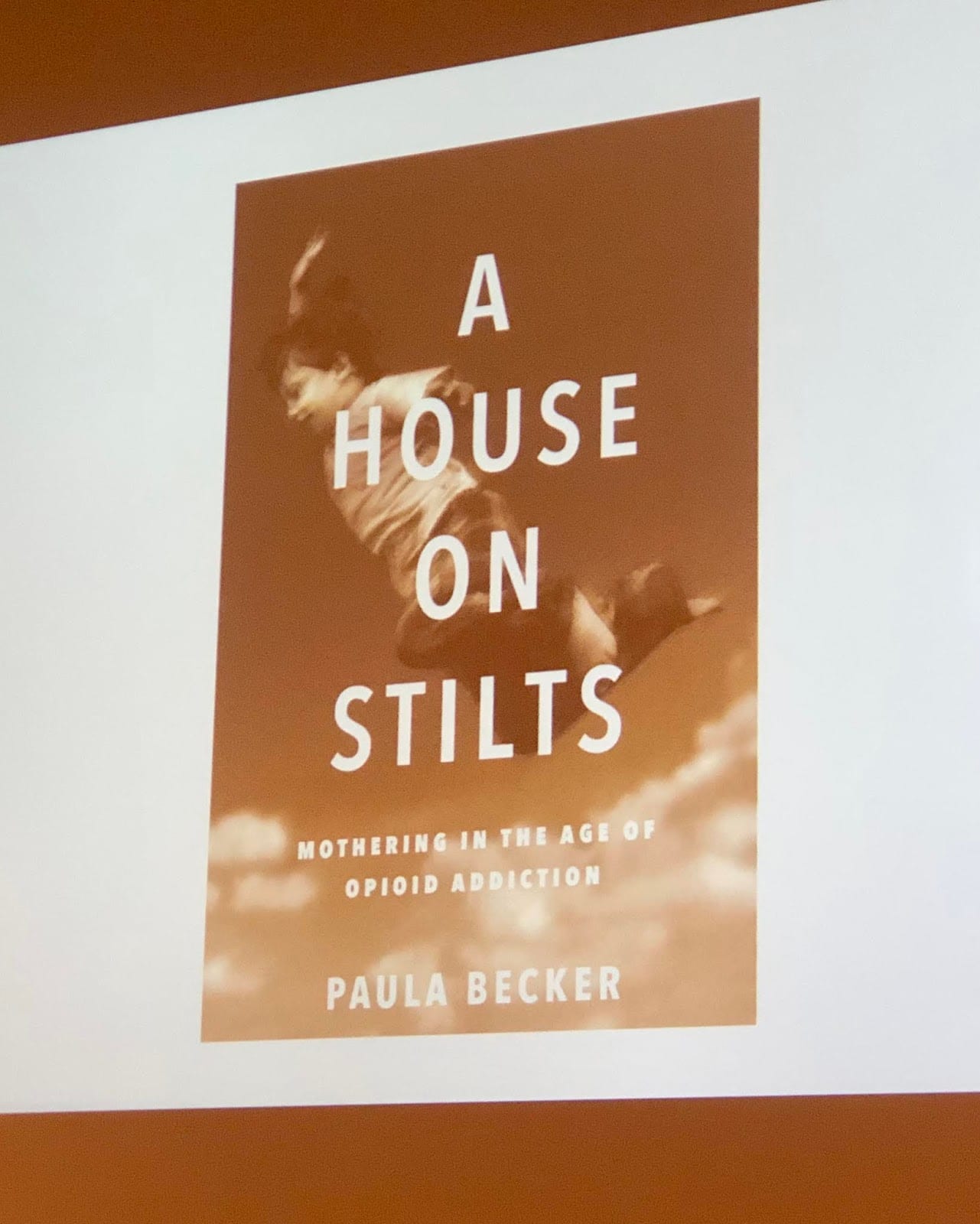
Yesterday, I went to a book launch that was very different from any other launch I’ve been to – for a book I’ve already read that brought me to tears more than once, as a writer, as a mother, as someone who loves people who struggle with addiction. The book is A House on Stilts, written by Paula Becker, and she took great care to bring this book out in to the world in partnership with representatives from agencies in Seattle who help young adults with addiction and homelessness.
More than once, I found myself swooning during the launch. First, when Paula spoke about addiction as a community issue, rather than a personal or familial one. Then again, when Christopher Hanson, the Director of Engagement Services for YouthCare in Seattle used the phrase “unconditional positive regard,” and when all of the panelists spoke about the necessary collaboration between families and social service agencies as we work to craft supports for young people in crisis.
Paula wrote this book knowing that there will be readers who will seek to distance themselves from her story because it is so painful, and many of them will do that by examining her choices and using them to excoriate her and her husband. The book itself is brilliant in the way it combines her personal journey as the mother of someone who fought opioid addiction with the facts about how our communities treat those who struggle and their families. While it is often incredibly sad, it is not a ‘woe is me’ tale or a defense of her individual choices, but a call to action that we must heed if we are to do right by this generation of young people who have been caught in the grip of addiction and all that it bleeds in to – unemployment, homelessness, mental illness, and physical health challenges.
Unfortunately, so many of our public health systems fail to adequately address the needs of young people and families who seek help – especially black and brown people. And over time, the continued failures make it hard to believe that the systems won’t do more harm than good. Threatening to put folks in jail, cut off services, remove children from their parents’ home – these are not ways to heal, and they are certainly not ways to engender trust. If you are a person who has been denied services or threatened with punishment of some sort over and over again, the likelihood that you will continue to ask for help gets smaller and smaller, and you become more isolated and more at risk of harm.
When families are expected to support a loved one with addiction in isolation, they quickly become overwhelmed. I have had personal experience loving and supporting someone who is constantly in crisis – waiting for the phone call that will tell me they are injured or dead, getting the phone call with an urgent plea for shelter or money, holding that person time and again while they shake and sob and say they are ready to get help. The toll it takes on your physical body is real, and the emotional triggers last for – well, decades at this point, and I don’t know if they’ll ever go away. The adrenaline rush that floods your body when you get that call, the shaking, the lump in your throat, the voice in your head that says, “it’s happening again and I have to marshall the strength to manage it,” are nearly impossible to ignore. If we do not have others to reach out to for help who don’t have the same visceral ties to the person struggling (and, thus, can help in different ways that are often more effective), we are quickly depleted in every way.
When partnerships are rooted in genuine care and a purposeful dovetailing of skill sets and resources, they are amazingly effective. As a family member or individual who is struggling, finding those people to partner with is challenging at best, and finding partners with adequate funding and training and physical space is even harder. When we can find them, as mothers and fathers and caregivers, we are allowed to set boundaries that enable us to continue to function and take care of ourselves. Paula’s story is not unique, and it is imperative that we listen to it keenly. Her willingness to share the pain of her journey with her son’s addiction and her ability to hold it up as a call to action for all of us to come together and recognize this as a community crisis is courageous and wise. Find this book, read it, and reach out. Our elected officials need to know that we want them to support funding for the agencies who are tasked with helping individuals with addiction. They need to know that we believe this is a crisis for all of us, that we all belong to each other, and that nobody can do this alone. Even families with financial resources cannot buy their way in to rehab facilities if there are no beds available.
Perhaps the most striking thing Paula said during the book launch was this: “…you cannot starve someone in to recovery, nor can you shame them in to it. I ask you to have compassion – the next time you see someone who is homeless, don’t look away. Offer a smile, meet their eyes, ask if they are hungry and buy them a sandwich.”
The beauty of this book is that compassion not only means kindness toward that one person you see struggling, but it also means that we need to work to build systems of compassion that support our community members in their endeavors to heal. We do, truly, all belong to each other. May we start acting like it, soon.



